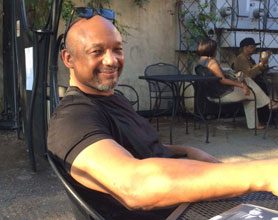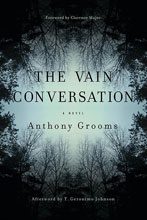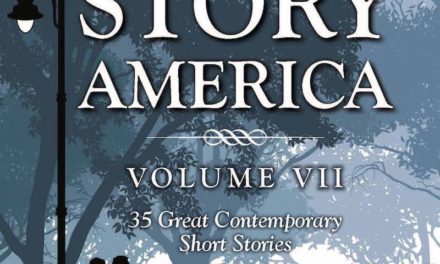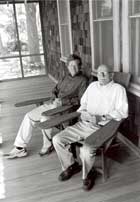
A few months ago, I closed a book and immediately posted the following on my Facebook page: “I just finished reading a novel for Story River Books, and I am reeling from its power. I’m not sure of the pub date, but don’t miss your chance to read The Vain Conversation by Anthony Grooms. I’m awestruck. If humanity is ever to evolve, if we are ever to rise to our potential – and that seems like a big “if” sometimes – I believe it won’t be through political squabbling and jousting for power, but through the great, brutal, compassionate vision of artists like this one. Thank God for good books.”
Since then, I’ve learned more about Tony Grooms – that he is a celebrated poet, short story writer, and novelist . . . a two-time winner of the Lillian Smith Prize for Fiction, a finalist for the Legacy Award from Hurston Wright Foundation, and a Fulbright Scholar. I also learned that his aforementioned brilliant new novel The Vain Conversation will be out in March.
On March 3rd, I’ll be interviewing Tony for the Pat Conroy Literary Center at Deckle Edge Book Festival in Columbia, then he’ll head to Beaufort the next day for our March Forth on March Fourth event at Penn Center.
Recently, Tony Grooms granted me this interview for the Conroy Center’s Porch Talk blog.
You’ve dedicated your new novel to “the memory of Alberta Grooms Ford, beloved family storyteller.” Can you tell me a little about her?
Aunt Alberta, often called “Bert” or “Berta,” was my father’s youngest sister. She was a second mother to me. She gave me my middle name, which like most middle names, cannot be shared in public. When I was a teen, I spent several summers with her in homes in the suburbs of Newark, NJ. Ostensibly, I was tutor and babysitter for my cousin, but for me, a boy from rural Virginia, these visits were a schooling. It was with Aunt Berta that I first saw New York City—The Bronx, not Manhattan. It was with her that I first saw the Atlantic Ocean. We went to Asbury Park. She took me to “grown-up” films like “The Christine Jorgensen Story,” about a transgendered woman. She often told stories in her slightly nasal and overly articulated speech, an affectation of Northern dialect that often betrayed rather than disguised her Southern roots. Her stories gave life and color to long dead relatives. She told of her grandfather who picked out all the specs of husk from his oatmeal before eating it; of her uncle who lay dying after a car accident, his head the size of a melon; or of a distant fore-bearer, a handsome man who rode a black horse on nightly courtships, and made half-sisters and brothers across the countryside. This man’s name was Rollins or Rawlings, she couldn’t remember which. He was my great-great grandfather. He did not give his name to his son, who would at age 12 adopt the name Grooms, the name of his mother’s husband. In retirement, Berta moved back to rural Virginia and, not entirely by choice, spent the last decades of her life caring for sick and elderly relatives. Still she loved visitors, and I and my family were prized visitors. My father told me once that when she learned of one of my visits, she looked like a child at Christmas. I enjoyed the visits too. My favorite times, at the end of the day, she would ask if I would like a toddy—bourbon and ginger—we would sip and she would tell stories.
You’ve written a novel based on a “true story” – the murder of four people in 1940s rural Georgia. How did you come across this story and what about it captured your imagination?
I first learned of the story of the Moore’s Ford Bridge lynching from a news article in the Atlanta Journal and Constitution in 1991. The article was about Clinton Adams, who claimed to have witnessed, as a 10-year old, the murder of two black couples by local white people, including the police. What interested me about the story was that Adams, a white man, had kept the story a secret for over 40 years, and for all those years what he saw had tormented him. He was a witness who, until the article, had no means to tell his story. Even now, as he has been in the news recently since the FBI has closed the investigation into the case, he talks about his witnessing as a burden. My story generates from this event, but I wholly invent the characters, their thoughts and their actions for the purpose of a narrative which explores the question of redemption.
As you’ve said, much of the story is told through the eyes of a young white boy who witnesses the murders, an event that haunts him for years and actually twists and distorts his development into manhood. How similar is the character of “Lonnie” to the real Clinton Adams, both as a boy and an adult?
Lonnie is wholly fictional, though the impetus for the character came from Clinton Adams’s  experience. I have made no attempt to base my story on any of the people involved with the actual historical event. Rather, I use the event itself, a rather common one in the South, as a way to explore themes of redemption. That Lonnie is a witness and not a perpetrator of the crimes complicates the question I am exploring in the novel. How does race violence touch us all? In what ways are we all culpable?
experience. I have made no attempt to base my story on any of the people involved with the actual historical event. Rather, I use the event itself, a rather common one in the South, as a way to explore themes of redemption. That Lonnie is a witness and not a perpetrator of the crimes complicates the question I am exploring in the novel. How does race violence touch us all? In what ways are we all culpable?
Ron Rash says of your novel, “it vividly evokes the horrors of American racism, but Anthony Grooms never denies the humanity of his characters, whether black or white, young or old. His novel achieves what only the best literature can give us: it refuses too-easy consolations or too-easy condemnations.” I was struck by this same quality in your book. You give us a vision is of a country where the “race problem” leaves nobody unscathed; where everybody feels its effects – not just the long-suffering black characters – and each generation is poisoned by it. It’s a literary universe where all the characters – black and white, male and female – seem trapped, and fairly miserable, in their preordained roles. Care to comment?
We are all entangled in our history—for better or for worse—it’s made us who we are. Any one immigrating here, becomes a part of the tangle, too, even as he might remain rooted in a different history. But we aren’t necessarily trapped. We have a choice about where history will take us. Several characters in my novel are determined to make changes, to redirect the growth of history, though its vines may still remain entangled. Doing so, however, is not easy—it often requires sacrifice, sometimes upheaval—but it’s been done many times already in our short American history. We are not trapped by our past of racial violence. We only need the collective will to make change—that is to redeem ourselves—and seek new relationships.
Speaking of “entangled vines,” the natural world looms large in The Vain Conversation. You write about it so beautifully and intimately, almost as if nature were a character in the book. How important is the natural world to your writing life . . . and to this novel?
I grew up in the country, in a place that is still largely piedmont forests and starry skies over fields. This central Virginia landscape is not very different from North Georgia where I set The Vain Conversation. Virginia doesn’t have the kudzu, but many of the species of plants and animals are familiar. Perhaps like an old style Transcendentalist, I feel that nature is permeated with some spiritual quality, but in my novel I am milking it for its symbolism. The forest has long been a symbol of the world of experience, and Lonnie, at ten, has wandered into it. But the forests of this setting are particularly tangled with vines that ensnare him—figuratively in a moral dilemma from which he struggles to escape. Because of its rural setting, this story allowed me to indulge in lyrical description of lush vegetation or ice-sheeted tree canopies. In other works, set in cities, I’ve not been able to exploit natural imagery to this degree, though nature is very important to me as a writer. After all, we are a part of it.
In your website autobiography, you write about growing up in Virginia, the oldest of six children, and going to school under the Freedom of Choice plan – which was your parents’ choice, not yours! – where you were one of few black children. You say you developed a “detached sensibility” there that has helped you as a writer . . . and yet, I find your characters so deeply and vividly realized, almost as if you’ve inhabited each of them completely, and grown to love them. (Even some of the nastier characters.) This love/detachment almost seems like a paradox. Can you elaborate?
Observation is the most powerful tool of the artist, and as a child on the margins, I developed this tool well—though with no real sense that I would be using it as a writer. In one way, it was a survival skill, one that helped me to sense where the social boundaries lay in the new paradigm of school integration. But of course, I had friends. I was not entirely isolated, but I knew—as did my friends—that I was the outsider in nearly every conversation or activity. In fact, this skill of observation may have been developed even before the Freedom of Choice experience and only heightened because of the social alienation. Nonetheless, the sense of being an outsider developed strongly during those years—and I took some pride in it, too. By the time I was in residence at a predominately white college, I was referred to by a professor as “a rebel without a cause.” Secretly, this pleased me. I was beginning to see myself as a writer. I am careful to say that a detached sensibility as an observer doesn’t mean that I didn’t have friends, or that I was always apart from people. That would indicate a psychosis. Remarkably, I think I am quite normal given my experiences, and I am very close to friends who comprise a multicultural group. I’d like to add, too, that observation as a literary tool is not a matter of emotional detachment. The observer must always, even while standing back to see nuances of body movement or to hear subtle changes in the pitch of voice—must also imagine how the subject feels. Even if that subject is a bully who is throwing a spitball, the writer-observer must see him as human.
That’s a great segue into my final question, which is really a few questions. You’ve taken the title of your book from the First Epistle of Peter 1:18, which reads, “Forasmuch as ye know that ye were not redeemed with corruptible things, as silver and gold, from your vain conversation received by tradition from your fathers.” You also quote David Mamet in an epigraph: “But what has our 230-year national experience been but a dialogue about race?” How do you think our dialogue is going these days? There’s a spark of hope at the end of your novel, but only a spark. Do you really believe it’s a vain conversation? If so, why do you believe that . . . and what do you think we can do to change that?
I searched long and hard for this title, the final in a very long list. I like it because it puns on the idea of a “vain” or prideful conversation and on a “conversation in vain.” In context, it refers to tradition—a tradition of sin passed down through the generations. Such a title, then, seems an appropriate description of the American history of racial violence and our response to it. At the core of the book, the characters explore the idea of redemption. I must say here that I was spurred in part by the many “race redemption” novels and movies that do not seem really to understand the difficulty or breadth of the problem. In my story, an ostensibly innocent character, a witness to the crimes, as you said earlier, is “distorted” by what he saw. I want the novel to ask the question more broadly than simply how do we deal with the murderers, but how do we deal with each other—who may, after all, be both victims and enablers of this system. It might seem extraordinary to say, but this isn’t just a question for whites—blacks and other minorities, too, must reckon, differently perhaps, with our roles in this “vain conversation” of our tradition.
As Mamet notes, we have been talking about race since the beginning of the colonization of North America. There are many examples in which we have engaged in productive conversation and progress—so nothing is hopeless! But, especially now, our loudest discourse is “vain” in the sense of being prideful pontification, or “in vain” because we are only shouting at each other, not having genuine dialogue. A genuine dialogue has to happen across cultural boundaries—not just preaching to the choir—and it has to be done quietly where each gets to speak and everyone listens. If only, when President Donald Trump, referring to the conflict in Charlottesville over the Lee statue, said, “You also had some very fine people on both sides,” he had opened a conversation that explored what he found to be “fine” about the people on both sides, and perhaps what he found “not fine” about the people. His statement could have opened a way to discovery, not simply mutual condemnation. I do not believe Mr. Trump intended to start a genuine conversation, as such cannot be achieved by tweets—and likely not by the talking heads of cable news entertainment. Rather, we must seek out each other for quiet, likely uncomfortable, but hopefully genuine dialogue.
Learn more about Anthony Grooms at www.anthonygrooms.com For more on Deckle Edge Book Festival, visit www.deckleedgesc.org. To learn more about March Forth on March Fourth, visit www.patconroyliterarycenter.com






